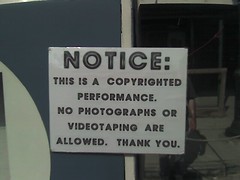A few observations and things learned from the last eight days.
Go to a page with a table, for example this one (sorry, semi-nsfw). Hold down the control key and select cells. How could I not have known about this!? Unfortunately, copy & paste seems to produce tab separated values in a single row even when pasting from mutliple rows in the HTML table (tried with Firefox and Epiphany). Still really useful when you only want to copy one column of a table, but if you want all of the columns, don’t hold down the control key and row boundaries get newlines as they should rather than tabs. (Thanks Asheesh.)
I feel really stupid about this one. I’ve assumed that a (US) Health Savings Account was a spend within the year or lose your contributions arrangement, but that’s what a Flexible Spending Account is (I have no predictable medical expenses, so such an account makes no sense for me). A HSA is an investment account much like an IRA, except you can spend from it without penalty upon incurring medical expenses rather than old age. You can only contribute to a HSA while enrolled in a high deductible health insurance plan, which I’ll try to switch to next year. (Thanks Ahrash.)
I saw a few presentations at LugRadio Live USA, in addition to giving one. Miguel de Icaza’s on Mono (content roughly corresponding to this post) and Ian Murdock’s on OpenSolaris were both in part about software packaging. Taken together, they make a good case for open source facilitating cross polination of ideas and code across operating system platforms.
Aaron Bockover and Gabriel Burt did a presentation/demo on Banshee, showing off some cool track selection/playlist features and talking about more coming. I may have to try switching back to Banshee as my main audio player (from Rhythmbox, with occasional use of Songbird for web-heavy listening or checking on how the program is coming along). Banshee runs on Mono, and both are funded by Novell, which also (though I don’t know how their overall investment compares) has an enterprise desktop linux product.
 John Buckman gave an entertaining talk on open source and open content (including the slide at right). My talk probably was not entertaining at all, but used the question ‘how far behind [free/open source software] is free/open culture?’ to string together selected observations about the field.
John Buckman gave an entertaining talk on open source and open content (including the slide at right). My talk probably was not entertaining at all, but used the question ‘how far behind [free/open source software] is free/open culture?’ to string together selected observations about the field.
Benjamin Mako Hill did a presentation on Revealing Errors (meant both ways). I found myself wanting to be skeptical of the power of technical errors to expose political/power relationships, but I imagine the concept could use a little hype — there’s definitely something there. The talk made me more sensitive to errors in any case. For example, when I transferred funds from a money market account to checking to pay taxes, an email notice included this (emphasis in original):
Your confirmation number is 0.
Zero? Really? The transaction did go through.
Tuesday I attended the Media Web Meetup V: The Gulf Between NorCal and SoCal, is it so big?, the idea being (in this context pushed by Songbird founder Rob Lord; I presented at the first Media Web Meetup and have attended a few others) that in Northern California entrepreneurs are trying to build new services around music, nearly all stymied by protectionist copyright holders in Southern California. I really did not need to listen to yet another panel asking how the heck is the music recording distribution industry going to use technology to make money, but this was a pretty good one as those go. One of the panelists kept urging technologists to “fix [music] metadata” as if doing so were the key to enabling profit from digital music. I suppressed the urge to sound a skeptical note, as investing more in metadata is one of the least harmful things the industry might do. Not that I don’t think metadata is great or anything.
Thursday evening I was on a ‘Copyright 2.0’ panel put on by the American Society of Media Photographers Northern California. I thought my photo selection for my first slide was pretty clever. No, copyright expansion is not always good for the interests of professional photographers. The other panelists and the audience were actually more open minded (both meanings) than I expected, and certainly realistic. The photographer on the panel even stated the obvious (my paraphrase from memory): new technology has allowed lots of people to explore their photographry talents who would otherwise have been unable to, and maybe some professional photographers just aren’t that good and should find other work. My main takeway from the panel is that it is very difficult for an independent photographer to successfully pursue unauthorized users in court. With the sometime exception of one, the other panelists all strongly advised photographers to avoid going to court except as a last resort, and even then, first doing a rational calculation of what the effort is likely to cost and gain. The best advice was probably to try to turn unauthorized users into clients.
Friday evening I went to San Jose to be on a panel about New Media Artists and the Law. Unlike Thursday’s panel, this one was mostly about how to use and re-use rather than how to prevent use. This (and some nostalgia) made me miss living in Silicon Valley — I lived in Sunnyvale two years (2003-2005) and San Jose (2005-2006) before moving back to San Francisco. Nothing really new came up, but I did enjoy the enthusiasm of the other panelists and the audience (as I did the previous day).
 Staturday I went to Ubuntu Restaurant in Napa, which apparently does vegetable cuisine but does not market itself as vegetarian. I think that’s a good idea. The food was pretty good.
Staturday I went to Ubuntu Restaurant in Napa, which apparently does vegetable cuisine but does not market itself as vegetarian. I think that’s a good idea. The food was pretty good.
I’ve been listening to Hazard Records 59 and 60: Calida Construccio by various and Unhazardous Songs by Xmarx. Lovely Hell (mp3) from the latter is rather poppy.



